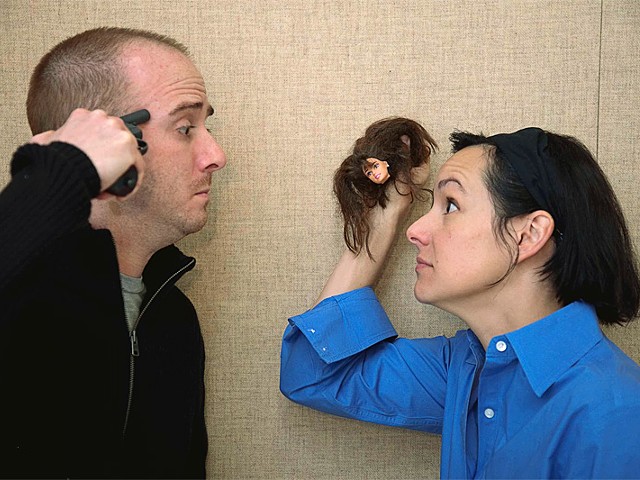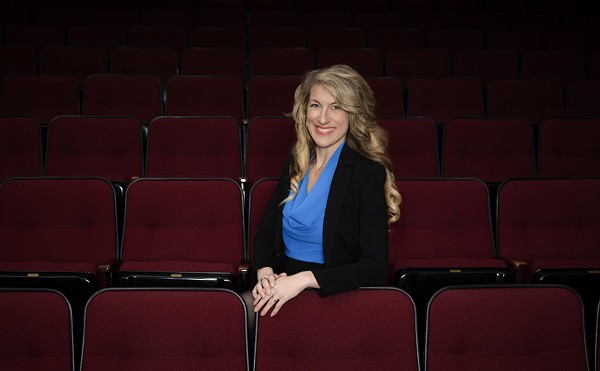Neil Simon was born in the Bronx in 1927. Herb Gardner was born in Brooklyn in 1934. In 1962 Simon's first play, Come Blow Your Horn, was in its fourteenth month on Broadway when Gardner debuted with A Thousand Clowns. Both fledgling playwrights seemed assured of bright futures. If you're interested in seeing how they turned out, two memory plays from the twilights of their careers reveal both writers returning to their roots.
Gardner's roots are the more literal. His final Broadway play, the semi-autobiographical Conversations With My Father (1992), which is being staged by New Jewish Theatre, is set in the same kind of Canal Street bar once owned by Gardner's Jewish immigrant father. Eddie Ross's oft-renamed tavern is a way station, or halfway house, where wayfarers can shed their fidelity to the Old World as they begin their pursuit of the American Dream. This assimilation takes its toll on the next generation, especially on Eddie's son Charlie (who of course is Gardner's surrogate). Depending on your tolerance for talk, Conversations unfolds as either a rich pastiche of random incidents or a drama sorely in need of a spine.
Whichever view you take, Conversations is the summation of an uncompromising career. Gardner often tangled with directors and actors who sought to trim his scripts. Perhaps more his father's belligerent son that he wished to acknowledge, Gardner adhered to the "please yourself" school of playwriting, audience be damned. If the play runs nearly three hours, so be it. For Gardner Conversations provided a kind of catharsis, but others might find it less involving, in part because the father is so unsympathetic. Eddie (Peter Mayer) is a walking cadaver who remains plagued by diarrhea of the mouth. It remains for the neighborhood regulars — an Irish bookie (Terry Meddows), a Yiddish actor (Alan Knoll), a delusional fellow who fancies himself to be Santa Claus (Bob Harvey) — to engage our interest.
But even if the play were flawless, this production, directed by Sidney J. Friedman, would be in trouble. Dunsi Dai has designed an atmospheric tavern whose barstools, tables and booths evocatively fill the stage of the Clayton High School Auditorium. Yet the cavernous auditorium (not to be confused with Clayton High's intimate Little Theatre — is as dead as Eddie himself. If you go, sit close.
Conversations is fiercely, defiantly unsentimental. By contrast, Neil Simon's Proposals, which premiered in 1997 and will likely be Simon's third-to-last Broadway comedy, is drenched in the roseate glow of sentimentality. If Gardner refused to kowtow to his audience, Simon has spent a lifetime cherishing his. Early in this modestly charming reverie, one of our heroine's former beaus (she has many) refers to their "nice summer flirtation." This entire play is a flirtation between Simon and an audience that for four decades has relied on him for laughter and escapism.
As he did at the beginning of his career in plays like Barefoot in the Park, Simon returns here to the deification of his first wife Joan (who died in 1973), now called Josie. Meg Rodd makes her as cute as all get-out. And although Simon tinkers with form — the play is narrated by a housekeeper who is dead (the lovely Choyce Johnson) — missing from this nostalgic interlude about summer courtship in the Poconos in 1953 is any semblance to Simon's character-driven scripts, such as Biloxi Blues and Broadway Bound. Instead he reverts to a reliance on the one-line joke that sustained his early career. ("Every line is so funny," the fellow behind me exclaimed at intermission).
The St. Louis Actors' Studio production, which was directed by Milton Zoth, is erratically cast. But as Josie's father, Whit Reichert turns out to be an ideal Neil Simon interpreter. Reichert infuses the play with an empathy that does not exist on the page. It's not there because, other than giving us an innocuously merry time, Simon doesn't seem to have much on his mind. By contrast, Herb Gardner has much on his mind — and he takes a heckuva lot longer to say it.





